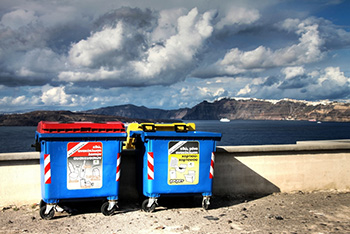by Maya Bornstein
 Photo by: Klearchos Kapoutsis | Fickr.com
Photo by: Klearchos Kapoutsis | Fickr.comWith a public debt exceeding 165% of their GDP, Greece is now suffering one of the worst economic situations in the first world. To their credit, the Greeks refuse to let the debt crisis cripple their progress as a nation. Greece continues to introduce measures to improve its quality of life and contribute to global development.
WEEE vs. electronic waste
Following the European Union’s introduction of the Waste Electrical and Electronic Equipment ordinance (or WEEE, as it is commonly known), the Greek Ministry of the Environment has taken steps to increase the recycling of electronic goods. Previously, millions of tons of electronic waste were dumped into destructive landfills each year. This international practice doesn’t just harm the surrounding land, water, and ecosystems, it also throws away tons and tons of recyclable materials, including thousands of tons of precious metals (including gold, silver, and copper), which can be found in electronic devices.
Erdwich Zerkleinerungssysteme’s e-scrap shredder
The Ministry therefore brought in the Hellenic Recycling Center to act as a facilitator in the recycling process. To accomplish this, the company developed a system allowing for huge quantities of appliances, high-tech devices, gadgets, and other electronic scrap to be sorted and subsequently recycled. The mechanism, developed by expert German engineers, is capable of processing and taking apart up to six tons of e-scrap per hour, without damaging the essential materials.
The shredder was introduced by a Bavarian company called Erdwich Zerkleinerungssysteme GmbH and has been successfully dismantling scrap, including washing machines, motors, refrigerators, ovens, and vending machines. Due to the importance of preserving the precious materials found inside these items, the process uses a gentle mechanism to tear apart and extract the valuable materials. The shredder prevents damage to the metals and the release of toxic substances. It has the power to stand up to tough constituents, like glass, steel, concrete, and iron.
Where it all ends up (hint: not landfills!)
While over 50% of the waste comprises of plastic and iron, the Greek company’s aim is to extricate valuable parts made of copper, stainless steel, aluminum, gold, silver, palladium, and brass, which are sorted by hand after the shredder has finished its work. When the precious stuff has been picked out by employees, hazardous materials, like batteries and mercury, are disposed of. After that, the remaining plastics, glass, and iron are refined and combed by a granulator to make certain no precious metals go to waste.
Despite the desperate economic climate, Greece is among those countries pushing for positive change in the world. This new program for recycling and safely disposing of electronic waste is not only in agreement with Europe’s WEEE directive; it is in line with the basic moral obligation of humans to preserve the earth.
Cash for Electronic Scrap USA seeks to further that cause by making it easy for people to recycle their electronic scrap for cash. If you have old electronics, dispose of them properly and profitably with Cash for Electronic Scrap USA.




